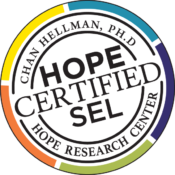Buckle up! Teaching kids to exceed their own expectations of themselves is not necessarily easy – but it’s why you got into education in the first place! Call Hope Rising (405-676-4140) and let the fun begin in earnest!


George W. Bush - or rather his speechwriter, Michael Gerson! - called it ‘the soft bigotry of low expectations’ - people’s habit of expecting less from others, in this case children, and thus discouraging them from reaching their full potential.
Hope Rising has updated its ‘My Best Me’ hope-based curriculum to incorporate the pedagogical theories and practices of a growth mindset approach to teaching children. The goal of growth mindset training is the same as that of cognitive behavioral therapy (CBT). Both require rewiring the brain by changing negative thoughts into more positive ones and seeing challenges as opportunities, rather than impediments.
You can learn more at https://hoperisingsel.com
The social-emotional learning (SEL) organization's revised SEL curriculum for middle schoolers, comprising separate and age-appropriate curriculums for all grades 5-9, zeroes in on a student’s frame of mind, recognizing that children have their own beliefs about their abilities and their potential.
These self-perspectives can be potent enough to shape kids’ behavior and forecast their success - a lens through which children interpret their experiences and future prospects. Hope Rising’s course, however, encourages a growth mindset - wherein students are taught to believe that they can enhance their intelligence and skills with an open mind and the drive to succeed.
You can review a sample lesson at https://info.hoperisingsel.com/social-emotional-learning-sample
The Stanford psychology professor who coined the term in a 2007 book, contrasts a growth mindset with a fixed mindset. A leading researcher in the field of motivation, Carol Dweck suggests that a growth mindset is characterized by a desire to learn, a readiness to take on challenges, and the ability to see failure as a stepping stone to success. Someone with a fixed mindset, on the other hand, looks at him or herself in the world from the opposite perspective: mistakes are viewed as irreversible defeats, risk-taking is never worth it, and new experiences should be avoided. Moreover, those with a fixed mindset always feel the need to prove their worth.
Hope Rising’s curriculum - and the foundational thinking behind both SEL and the science of hope - firmly align with a growth mindset, providing middle school children with a well-grounded sense of confidence and a ‘can-do’ attitude that will serve them well in high school and beyond.
By teaching students how to treat setbacks as opportunities, Hope Rising’s lesson plans can help teachers demonstrate the skills and perspectives that are essential for children if they want to thrive both academically and in life.
A growth mindset informed by the principles of SEL and the science of hope can yield significant benefits for both individuals and the larger school community - including increased student engagement, a greater willingness to invest in relationship-building, and a superior learning environment based on trust and respect.
Sometimes, you - as parents and teachers - forget that kids need to learn from their mistakes, their bad decisions, and their failures. And be free to make their own decisions - because, in the long run, coddling them will never produce a happy outcome!
Go to https://hoperisingsel.com/the-case-for-sel and instill a growth mindset in the kids under your care. Some day, they will thank you (probably AFTER the teenage years!).
